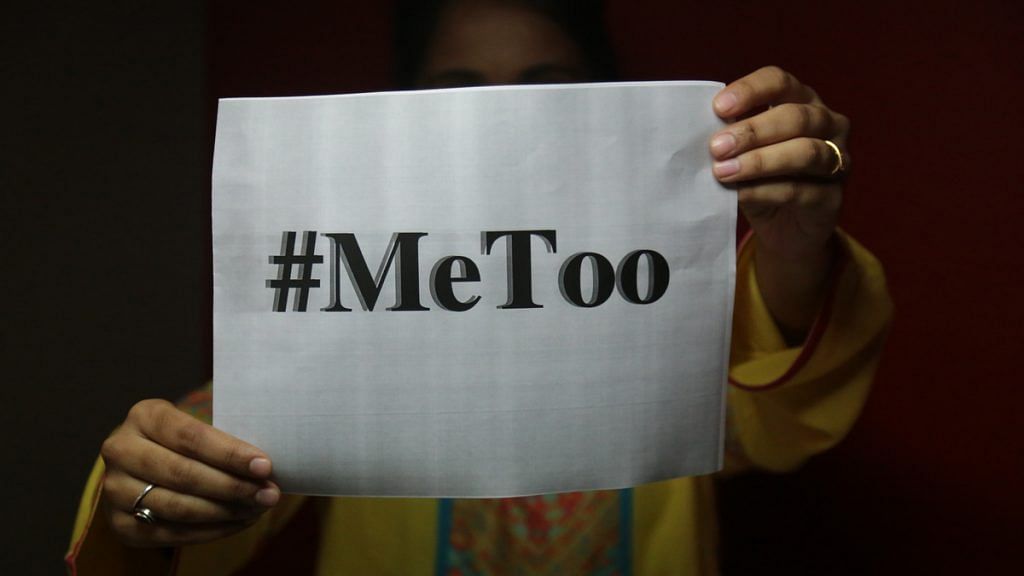The registry faced bitter and dogmatic opposition but #MeToo is being hailed as the next wave in online feminism.
It took just 10 days for India’s liberal feminists to change their stance on naming and shaming sexual assaulters, and that is the disturbing hypocrisy in the raging #MeToo campaign.
Two recent developments in India’s efforts to tackle chronic sexual assault had very different reactions from liberal feminists: sex offenders’ registry and #MeToo.
Many of the Indian women who are now cheering the resignation of M.J. Akbar as their first big victory in the #MeToo campaign had opposed the government’s decision to implement sex offenders registry just last month.
If you look closely, both these developments are essentially doing the same – naming and shaming sexual assaulter and publicly outing the whisper networks. But the registry faced bitter and dogmatic opposition while the hashtag war called #MeToo, against predatory men who breached consent, is being hailed as the next wave in online feminism.
In September, the government decided to dashboard the database of convicted sexual offenders and make it available for law enforcement officers across the country. This was a demand that came up during the national outcry that followed the 2012 protests after the fatal gang-rape of Jyoti Singh. Apart from being a crime control measure, this kind of registry can also help women equip themselves with crucial information and stay safe, many argued.
But as soon as the measure was announced, a number of legal scholars, feminists and counsellors attacked the very concept, calling it a regressive measure that reduced the chance of reform and rehabilitation for the convicts. Some said rape convicts whose name appear in a registry could be discriminated against in employment, leading to profiling, and that such a list might even push them back into committing more crimes. Many quoted studies from countries that had implemented this measure – like the United States – to say it just does not work. The convict, they argued, should be prevented from being condemned to a second prison sentence socially.
Also read: Registry of sex offenders carries immense risks. It also puts the survivor in mortal danger
But why are some of these women now sharing and retweeting #MeToo stories and screenshots? The conundrum deepens because the names that have been called out on Twitter and Facebook are publicly available for all to see. The names on the registry were only for officers to use and yet found resistance.
Is there a contradiction in these two acts? After all, many of the horrid experiences were shared through anonymous and unverified screenshots, yet they’ve been hailed as part of a powerful organic campaign against toxic male impunity. If naming and shaming, and warning others about the lurking predators are a good thing, the sex offenders’ registry should not have been dismissed. After all, the names of the convicts in the registry would have emerged from the ‘due process’ of the law – a police complaint, investigation, court trial, conviction and punishment.
But #MeToo enthusiasts hate even the smell of ‘due process’ – I would add rightly so. That’s because due process has further victimised women and only emboldened the entitled patriarchal networks in society.
Also read: India to get first sex offenders’ list: Answer to rape culture or limiting room for reform?
One reason could be that the default mode of feminists is to distrust the state as an arbiter and facilitator in their struggles. And many feminists are liberals or leftists and are schooled to not only question top-down solutions but also believe in the idea of allowing room for individual reform.
Their distrust is also because of the fault lines in India’s due process – tardy police investigations, police bias and long and expensive court trials (not to mention the number of parents who file complaints of rape against men their daughters fall in love with or elope with). Can the names that come out of this ‘due process’ be trusted to be put on a permanent state database?
The transformative public conversations that were engendered by Raya Sarkar’s list last year and the recent #MeToo are a potent expression of anger against the culture of silencing that women have endured.
Also read: Why ‘The List’ shouldn’t become the new four-letter word in Indian feminism
In this collective purge, sharing stories, naming names becomes paramount. Even those who were opposed to Raya Sarkar’s list have now supported #MeToo. One reason is that in the latter, there is no single person who played gatekeeper this time. Several women were self-broadcasting their stories, or through their friends. Many women on Twitter offered to keep their DMs public and accessible so that the stories could pour in. It was more diffused than Sarkar’s list, they said. The official registry of offenders, on the other hand, has the state playing gatekeeper.
India’s #MeToo is offering us new tools to negotiate the gendered universe. The established ways of fighting patriarchy are being challenged. Women must ponder whether there is any room for the state to play a role in this social-media fuelled fight. Is the state capable of being an ally or has #MeToo sidestepped the state completely?
